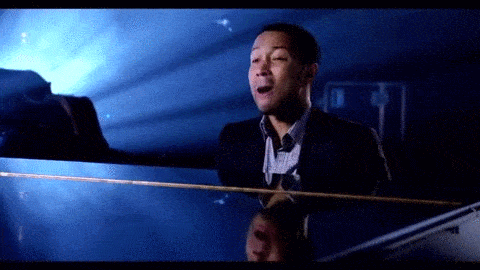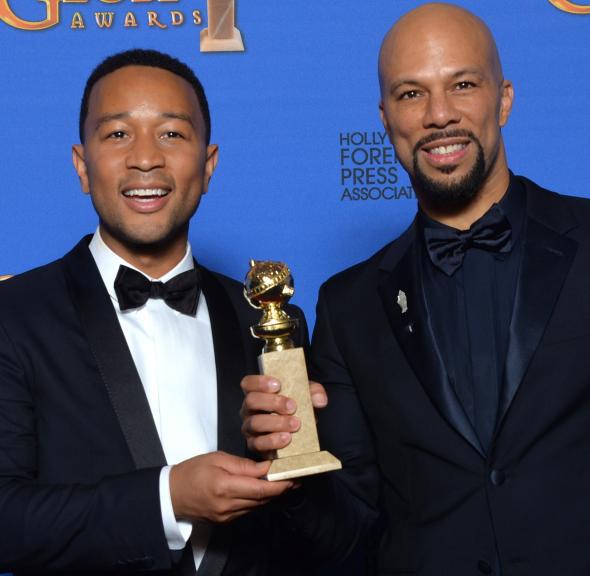By the time the closing credits began to roll at the end of Selma, I was moving toward tears. After two hours watching Ava DuVernay’s dramatic retelling of the events that led up to the signing of the Voting Rights Act of 1965, I felt disturbed, saddened, and invigorated all at once. But then, I heard Common’s “Glory.”
John Legend hammered weightily at the piano while wailing the gospel-tinged chorus. Common began rapping in that way he so often does (which is to say, preaching) about Rosa Parks refusing to sit on the bus and men and women becoming legends. The effect of the movie was still with me, but it began to sour as I experienced an unwelcome jolt to the senses. “Glory” is everything Selma is not: Deifying, ham-fisted, and blaring at you with its own sense of self-importance.
Consider these lyrics:
From dark roads he rose, to become a hero
Facin’ the league of justice, his power was the people
Enemy is lethal, a king became regal
Saw the face of Jim Crow under a bald eagle
While the song insists that it’s about a movement (“No one can win the war individually,” intones Common), the song lifts Martin Luther King up on a gold-encrusted pedestal, reverting to the same warmed-over rhetoric (that cutesy “king” pun!) that too often surrounds the language of the Civil Rights Movement. Worse, it risks raising the civil rights leader up further, exalting him with Messianic language: “Even Jesus got his crown in front of a crowd.” There’s no room here for the humanizing qualities King possessed in real life and in Selma. While the movie shows King’s uncertainty on the Edmund Pettus Bridge, Common simply has him rising from those “dark roads” as “a hero.” When the rapper mentions the “league of justice,” you almost wonder whether it’s a reference to DC Comics.
But if you really want to see the song’s self-aggrandizing tone in action, you should watch its video. Common may have delivered a tasteful performance in the movie (in which he plays the activist James Bevel), but here he and Legend furiously emote and grandstand at levels dangerously close to self-parody. As the rapper’s leaden lyrics trip through the song, his arms flail to embody every other word or phrase—as he sings about “pointing to the mountaintop,” he points into the distance: He might mean to conjure up that storied peak from the Bible and from King’s words, but all he really conjures up is everything terrible about slam poetry. As he mouths the word “glory” at the chorus, he stares deeply into the distance, he sweeps his arm down emphatically, and a proud smile spreads across his face.

GIF by Slate
Of course, Common has a habit of sometimes coming across as more “after school special” than especially moving. (He also has a track record of taking his songs quite literally when performing them.) But I’d expect him to cook up a little less corn for a movie that’s so far from corny. On tracks like “The Corner,” “A Song for Assata,” and many songs from his more recent Nobody’s Smiling, Common has kept it relevant and evocative without sounding stiff and condescending: Lyrics like “Shorties blunted-eyed and everyone wanna rhyme/ Bush pushing lies, killers immortalized/ We got arms but won’t reach for the skies” from the intro to his 2005 album Be manage at once to be more dense and to flow more naturally than any moment of “Glory.”
And yet “Glory” is considered the front-runner and a near lock for the Oscar for Best Original Song. Common and Legend have already won a Golden Globe—the former practically rapped his viral acceptance speech, which touched on both current events and moments in the movie—and the song closed out last week’s Grammy Awards, for no other apparent reason than to stir up more support for the song. When I read about people moved to tears by the song, I just can’t relate. Perhaps, because I was not alive during the times of MLK, I cannot appreciate the “stirring” nature of the song. Then again, my youth hasn’t prevented me from appreciating Selma.
A more cynical reading would suggest that, if the Academy goes for “Glory” on Oscar night, it might be because its voting members (which a 2012 Los Angeles Times report found to be more than 90-percent Caucasian, with a median age of 62) want to make themselves feel better for (presumably) passing over Selma in every other category. They might want to make a political statement, but if they do, I’d be just as happy with a win for the satirical “Everything Is Awesome.”
If there’s any hope in all this, it’s that plenty of films have left enduring legacies that have nothing to do with their wins and losses on Oscar night. Hopefully, Selma’s legacy as a great film will long outlast the memory of its unfortunate theme song.
Correction, Feb. 19, 2015: Due to an editing error, this post originally implied that the Justice League is from Marvel Comics. The team of superheroes is from DC Comics.
Previously
How Accurate Is Selma? We’ve Separated Fact From Fiction.
